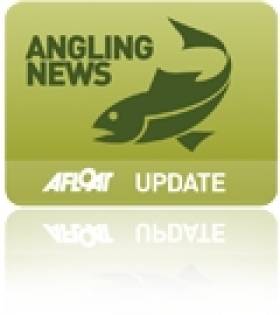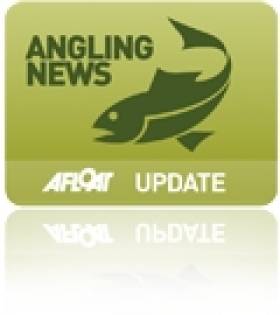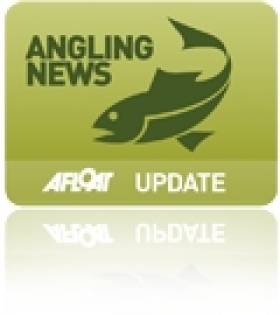Displaying items by tag: Irish Angling Development Alliance
#Angling - Minister Fergus O'Dowd launched Ireland’s first purpose-built disinfection station for angling enthusiasts at Ballyhoe Lake in Co Cavan on Wednesday 3 April.
The new facility - developed by Inland Fisheries Ireland (IFI) in co-operation with Interreg IVA (CIRB), the Irish Angling Development Alliance (IADA) and the local Meathhill Angling Club - will facilitate the disinfection of angling equipment on entry to the lake, helping to ensure that unwanted alien invasive species and harmful fish pathogens can be kept out of our natural fisheries.
Moreover, the development will also provide a template for further such facilities on fishery watercourses throughout the country.
The disinfection station is located at the entrance to Ballyhoe Lake, a prime Irish specimen tench fishery.
The entrance gate and the disinfection station are secured with combination locks, the numbers for which are available through nominated members of the Meathhill Angling Club (contact numbers for these members are provided on the tank). Members of the club will replace the disinfectant and manage the facility locally, as necessary.
Once opened, the tank contains a disinfection container for boots, keep nets, landing nets and stink bags. Disposable gloves are provided for angler use while disinfecting, and a brush is available to scrub boots, as well as a spray bottle for boats coming onto the lake.
Signage adjacent to and underneath the lid of the tank provides step-by-step instructions for the angler. Once the gear has been disinfected, the anglers apply a tag to his or her net to show that the process has been completed. Different colour tags will be utilised at the discretion of the operators.
Congratulating Meathhill Angling Club and the IADA at the launch, Minister O'Dowd said: "Angling clubs and federations the length and breadth of Ireland are key to the protection of our angling resources. By providing facilities such as this, we are adding to the goodwill and community commitment of Meathhill Angling Club to protect their fishery, while also ensuring access to it.
"This access helps to safeguard the sustainability of our valuable resource which will continue to bring much needed revenue to the local community through responsible angling activity."
The minister added that he "can’t emphasise enough the role anglers and clubs have on the frontline in the fight against invasive species, which supplements the great work in the area carried out by IFI with the support of representative bodies such as IADA."
#NEWS UPDATE - The Irish Petroleum Industry Association (IPIA) has proposed a suite of measures aimed at tackling the problem of illegal diesel washing in Ireland.
In a statement, the industry body for Ireland's fuel industry says that the practice is costing the Exchequer as much as €155 million annually in lost fuel duty.
"While other jurisdictions have to tackle this sort of fraud, the sheer scale of criminal washing of diesel is a particularly Irish disease," it said.
The IPIA's recommendations include the introduction of "a strong regulatory regime" to control the sale of rebated fuel, a new market for off-road diesel that is harder to disguise or remove, the closure of unlicenced filling stations, and a "radical overhaul" of the currently "absurd" penalties for offending retailers.
The Irish Angling Development Alliance (IADA) has fully backed the IPIA's proposals, citing the dangers of toxic waste byproducts from diesel washing operations.
"This toxic waste has been dumped illegally across the country, where it can enter the water table, not only seriously polluting water courses but also clean drinking water supplies."
IADA Hosts 'Biosecurity Awareness' Evenings for Anglers
#ANGLING - The Irish Angling Development Alliance (IADA) is running a series of biosecurity awareness evenings at venues across Ireland over the next two months.
The evenings follow from the "success" of the IADA's awareness section at the recent Ireland Angling Show, and will provide an opportunity for more people to "meet with experts in the field and see what invasive species are first-hand".
Three events, in association with Inland Fisheries Ireland, are scheduled:
- 27 March at the Wetlands Centre, Ballybay, Co Monagahan (hosted by the Ballybay Angling Association)
- 18 April at the Cavan Crystal Hotel, Cavan (hosted by the Cavan Anglers Club)
- 23 May at the Salthill Hotel in Salthill, Galway (hosted by the Galway CAC)
All events run from 7:30pm till 9pm. Admission is free and all are welcome.
For more information contact Peter Walsh at [email protected]
'No Dip No Draw' Policy for Irish Anglers
Inland Fisheries Ireland has implemented 'no dip no draw' policy for competitive angling to prevent the spread of invasive species in Ireland's inland waters.
The policy, developed by the Irish Angling Development Alliance and endorsed by all affiliated clubs, aims to prevent Irish rivers and lakes coming in to contact with "a wide range of aquatic species of pathigens that could prove harmful to our game, coarse and pike fisheries" and which could "easily and inadvertently be introduced to Irish watercourses through contamination of angling equipment and associated gear".
As a result, disinfection prior to events for any and all angling equipment or tackle that comes into direct contact with fish or water is mandatory.
The IFI provides details for anglers and competition organisers regarding best procedure for implementing the policy in its Code of Practice, currently available online HERE.
































































